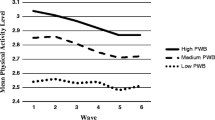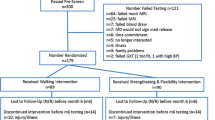Abstract
Background: Many women experience detriments in mental health during the menopausal transition. Physical activity may attenuate these adverse outcomes but few studies investigating such effects exist.Purpose: This study examined the effects of a 4-month randomized controlled exercise trial on mental health outcomes in 164 previously low-active middle-aged women (M age=49.9; SD=3.6).Methods and Results: Participants completed body composition and fitness assessment and a battery of psychological measures at the beginning and end of a 4-month randomized controlled exercise trial with three arms: walking, yoga, control. The results indicated that walking and yoga were effective in enhancing positive affect and menopause-related QOL and reducing negative affect. Women who experienced decreases in menopausal symptoms across the trial also experienced improvements in all positive mental health and QOL outcomes and reductions in negative mental health outcomes. Whether menopausal symptoms increased or decreased across the trial appeared to be determined in part by whether there were increases or decreases in cardiorespiratory fitness.Conclusions: Physical activity appears to enhance mood and menopause-related QOL during menopause, however, other aspects of mental health may be affected only as a result of reduction in menopausal symptoms. Increasing cardiorespiratory fitness could be one way to reduce menopausal symptoms.
Similar content being viewed by others
References
U.S. Census Bureau: United States Census 2000. Retrieved March 13, 2007 from http://www.census.gov/population/www/cen2000/phc-ta.html
U.S. Census Bureau:Facts & features: Women’s history month. Retrieved August 26, 2005 from http://www.census.gov/Press-Release/www/2004/cb04-ff04.pdf
NIH State-of-the-Science Panel: National Institutes of Health State-of-the-Science Conference statement: Management of menopause-related symptoms.Annals of Internal Medicine. 2005,142:1003–1013.
North American Menopause Society:Menopause Core Curriculum Study Guide. Cleveland, OH: NAMS, 2000.
North American Menopause Society: Treatment of menopause-associated vasomotor symptoms: Position statement.Menopause. 2004,2:11–33.
Bosworth HB, Bastian LA, Kuchibhatla MN, et al.: Depressive symptoms, menopausal status, and climacteric symptoms in women at midlife.Psychosomatic Medicine. 2001,63:603–608.
Dennerstein L, Dudley EC, Hopper JL, Guthrie JR, Burger HG: A prospective population-based study of menopausal symptoms.Obstetrics & Gynecology. 2000,96:351–358.
Greene JG: Constructing a standard climacteric scale.Maturitas. 1998,29:25–31.
Dennerstein L, Lehert P, Guthrie J: The effects of the menopausal transition and biopsychosocial factors on well-being.Archives of Women’s Mental Health. 2002,5:15–22.
Blumel JE, Castelo-Branco C, Binfa L, et al.: Quality of life after the menopause: A population study.Maturitas. 2000,34:17–23.
Schneider HPG: The quality of life in the post-menopausal woman.Best Practice & Research Clinical Obstetrics & Gynaecology. 2002,16:395–409.
Freeman EW, Sammel MD, Lin H, Nelson DB: Associations of hormones and menopausal status with depressed mood in women with no history of depression.Archives of General Psychiatry. 2006,63:375–382.
Joffe H, Hall JE, Soares CN, et al.: Vasomotor symptoms are associated with depression in perimenopausal women seeking primary care.Menopause. 2002,9:392–398.
Blumenthal JA, Fredrikson M, Matthews KA, et al.: Stress reactivity and exercise training in premenopausal and postmenopausal women.Health Psychology. 1991,10:384–391.
Slaven L, Lee C: Psychological effects of exercise in adult women: The impact of menopausal status.Psychology and Health. 1994,9:297–303.
Slaven L, Lee C: Mood and symptom reporting among middle-aged women—the relationship between menopausal status, hormone replacement therapy, and exercise participation.Health Psychology. 1997,16:203–208.
Wilbur J, Miller A, Montgomery A: The influence of demographic characteristics, menopausal status, and symptoms on women’s attitudes toward men opause.Women & Health. 1995,23:19–39.
Gold EB, Sternfeld B, Kelsey JL, et al.: Relation of demographic and lifestyle factors to symptoms in a multi-racial/ethnic population of women 40–55 years of age.American Journal of Epidemiology. 2000,152:463–473.
Ivarsson T, Spetz AC, Hammar M: Physical exercise and vasomotor symptoms in postmenopausal women.Maturitas. 1998,29:139–146.
Sternfeld B, Quesenberry CP, Jr., Husson G: Habitual physical activity and menopausal symptoms: A case-control study.Journal of Women’s Health. 1999,8:115–123.
Gold EB, Block G, Crawford S, et al.: Lifestyle and demographic factors in relation to vasomotor symptoms: Baseline results from the study of women’s health across the nation.American Journal of Epidemiology. 2004,159:1189–1199.
Boraz MA, Simkin-Silverman LR, Wing RR, et al.: Hormone replacement therapy use and menopausal symptoms among women participating in a behavioral life-tyle intervention.Preventive Medicine. 2001,33:108–114.
Lindh-Astrand L, Nedstrand E, Wyon Y, Hammar M: Vasomotor symptoms and quality of life in previously sedentary postmenopausal women randomised to physical activity or estrogen therapy.Maturitas. 2004,48:97–105.
Teoman N, Ozcan A, Acar B: The effect of exercise on physical fitness and quality of life in postmenopausal women.Maturitas. 2004,47:71–77.
Ueda M: A 12-week structured education and exercise program improved climacteric symptoms in middle-aged women.Journal of Physiological Anthropology & Applied Human Science. 2004,23:143–148.
Wilbur J, Miller AM, McDevitt J, Wang E, Miller J: Menopausal status, moderate-intensity walking, and symptoms in midlife women.Research and Theory for Nursing Practice. 2005,19:163–180.
Aiello EJ, Yasui Y, Tworoger SS, et al.: Effect of a yearlong, moderate-intensity exercise intervention on the occurrence and severity of menopause symptoms in postmenopausal women.Menopause. 2004,11:382–388.
Courneya KS, Mackey JR, Bell GJ, et al.: Randomized controlled trial of exercise training in postmenopausal breast cancer survivors: Cardiopulmonary and quality of life outcomes.Journal of Clinical Oncology. 2003,21:1660–1668.
Asikainen TM, Kukkonen-Harjula K, Miilunpalo S: Exercise for health for early postmenopausal women: A systematic review of randomised controlled trials.Sports Medicine. 2004,34:753–778.
Asikainen TM, Miilunpalo S, Oja P, et al.: Randomised, controlled walking trials in postmenopausal women: The minimum dose to improve aerobic fitness?British Journal of Sports Medicine. 2002,36:189–194.
Adams J: Exploring yoga to relieve menopausal symptoms.Holistic Nursing Practice. 2003,17:166–167.
Sander E: Menopause—the Yoga Way: Yoga can ease away uncomfortable symptoms—and change your whole attitude toward this profound life transition.Yoga Journal. 1996:61–71.
Eisenberg DM, Davis RB, Ettner SL, et al.: Trends in alternative medicine use in the United States, 1990–1997: Results of a follow-up national survey.Journal of the American Medical Association. 1998,280:1569–1575.
Keenan NL, Mark S, Fugh-Berman A, et al.: Severity of menopausal symptoms and use of both conventional and complementary/alternative therapies.Menopause. 2003,10:507–515.
Soules MR, Sherman S, Parrott E, et al.: Executive summary: Stages of reproductive aging workshop (STRAW).Fertility and Sterility. 2001,76:874–878.
Kessler RC, Greenberg DF:Linear Panel Analysis. New York: Academic, 1981.
Kohl HW, Blair RS, Paffenbarger J, Macera CA, Kronenfeld JJ: A mail survey of physical activity habits as related to measured physical fitness.American Journal of Epidemiology. 1988,127:1228–1239.
American College of Sports Medicine:ACSM’s Guidelines for Exercise Testing and Prescription (6th Ed.). Baltimore: Lippincott Williams & Wilkins, 2000.
Kammann R, Flett R: Affectometer 2: A scale to measure current level of general happiness.Australian Journal of Psychology. 1983,35:259–265.
Beck AT, Ward CH, Mendelson M, Mock J, Erbaugh J: An inventory for measuring depression.Archives of General Psychiatry. 1961,4:561–571.
Utian W, Janata JW, Kingsberg SA, Schluchter M, Hamilton JC: The Utian Quality of Life (UQOL) Scale: Development and validation of an instrument to quantify quality of life through and beyond menopause.Menopause. 2002,9:402–410.
Diener E, Emmons R, Larsen R, Griffin S: The satisfaction with life scale.Journal of Personality Assessment. 1985,49:71–75.
Borg GA:Borg’s Perceived Exertion and Pain Scales Book. Champaign, IL: Human Kinetics, 1998.
Kingsland K, Kingsland V:Complete Hatha Yoga. New York: Arco, 1983.
Iyengar BKS:Yoga: The Path to Holistic Health. London: Dorling Kindersley, 2001.
Biddle SJH: Emotion, mood, and physical activity. In Biddle SJH, Fox KR, Boutcher SH (eds),Physical Activity and Psychological Well-Being. New York: Routledge, 2000, 63–87.
Lee SW, Mancuso CA, Charlson ME: Expectations and outcomes associated with new practice of energy-yoga: Qualitative study.Journal of Clinical Epidemiology. 2003,56:922.
Elavsky S, McAuley E: Physical activity, symptoms, esteem, and life satisfaction during menopause.Maturitas. 2005,52:374–385.
Hammar M, Brynhildsen J, Wyon Y, Nedstrand E, Notelovitz M: The effects of physical activity on menopausal symptoms and metabolic changes around menopause.Menopause. 1995,2:201–209.
Thurston RC, Joffe H, Soares CN, Harlow BL: Physical activity and risk of vasomotor symptoms in women with and without a history of depression: Results from the harvard study of moods and cycles.Menopause. 2006,13:553–560.
Author information
Authors and Affiliations
Corresponding author
Additional information
This material is based on work conducted at the University of Illinois and was supported by the National Institute of Mental Health under Award No. MH073255-01, National Institute on Aging under Award No. AG12113, American College of Sports Medicine, Life Fitness Academy, and Paul D. Doolen Scholarship for the Study of Aging.
About this article
Cite this article
Elavsky, S., McAuley, E. Physical activity and mental health outcomes during menopause: A randomized controlled trial. ann. behav. med. 33, 132–142 (2007). https://doi.org/10.1007/BF02879894
Issue Date:
DOI: https://doi.org/10.1007/BF02879894




